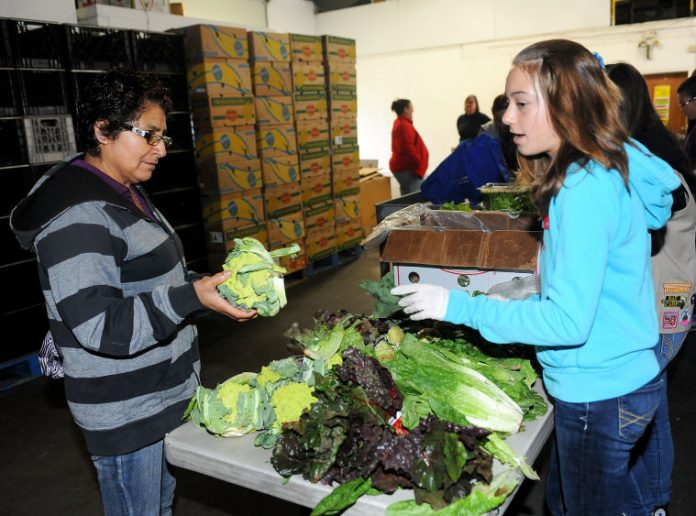
The Community Food Bank of San Benito County was recently sent a shipment of frozen spinach with labels that read “Test Product” and “Do Not Eat” that was distributed to residents, the Free Lance has learned.
Mary Anne Hughes, the executive director of the bank, said the food was OK’d to eat but the labels were not covered by volunteers – which is the usual protocol.
The food was donated to Second Harvest Food Bank in Watsonville and eventually found its way to the Community Food Bank of San Benito County, she said.
“What happened was that they failed to put a tag over the line that said ‘Do Not Eat,’” Hughes said in a phone interview Feb. 7.
She said that she was told the food came from a U.S. Department of Agriculture testing facility. Upon investigation, the Free Lance found that there is a USDA Agricultural Research Service Crop Improvement and Protection Research testing facility in Salinas that does utilize spinach for testing. When reached out to by the Free Lance, the facility said the food in question did not come from that facility. Furthermore, other USDA and Food and Drug Administration officials, who regulate spinach products, said the packages did not come from them and did not know where it came from.
“We would never send anything to the public that would be harmful in any way,” said Sandy Miller Hays, the director of information for the USDA Agricultural Research Service, out of Maryland, in a phone interview last week. “We do donate them (some testing products) to food pantries, but it is always perfectly safe to eat.”
The spinach was distributed by Small Planet Foods, a subsidiary of General Mills, out of Sedro-Woolley, Wash. The product in question is Cascadian Farms Organic-cut spinach.
When the Free Lance reached out to Small Planet Foods and General Mills for comment, Mike Siemienas, the media relations manager for General Mills, said the product was packaged for internal testing purposes, which is why it was labeled “Test Product.” The company does donate products with the label – which are not used for testing purposes to foods banks, he said in a phone interview Monday.
“We did inform the food bank it was safe for consumption,” he said.
Scott Taylor, the vice president of manufacturing at Del Mar Food Products Corp. in Watsonville, which packaged the spinach for General Mills, said it had donated the food to Second Harvest but was “disappointed” the packages were not labeled correctly.
He said General Mills had asked them to print “Test Products: Do Not Eat” on the products for testing purposes to keep them separated from other inventory.
“It’s (the spinach) worth a lot of money, and we hated to throw them way,” he said in a phone interview Monday.
Hughes said she has not received any complaints from people who received the food and has not heard of anyone that got sick after eating the spinach. A resident did, however, inform the Free Lance of concerns regarding the test products. That person requested anonymity.
“The food was good,” Hughes said. “There was nothing wrong with the food whatsoever.”
She said that when she discovered the bank had received the boxes with the label, she contacted Second Harvest to find out what happened.
“Whoever donated it to Second Harvest said it had been released by the USDA, but they didn’t do it (put a tag) on every package,” she said.
She said the Community Food Bank has never received products that were mislabeled.
Brooke Sampson, the chief operations and program officer at Second Harvest, confirmed the group had received the food from a “local food processor” and had sent it to the food bank in Hollister.
“They did donate it, so it was safe for human consumption,” she said in a phone interview last week.
She said their warehouse normally uses volunteers to place labels on the boxes before they are shipped out. She said the warehouse must have missed some boxes.
“We didn’t knowingly distribute those without any labels,” she said.
She said she can see how people are “concerned” about the labels but said she hopes people continue to donate.
“Food banks are really hurting for donations,” she said.
Other food issues:
In addition to the food with the “Do Not Eat” labels, the food bank in Hollister also faces questions about moldy food that might have been distributed, including fruits and vegetables.
“We get food from a lot of different places,” Hughes said. “Sometimes when people donate it, it’s on the edge.”
She said that occasionally the bank will come upon food that has mildew on it but said the bank takes care to throw away any moldy food, including food that touches it.
“This is donated food,” she said. “It’s not ready for primetime.”
She said that the bank serves over 1,200 bags of food to Hollister citizens over the weekends.
“We don’t want sick people,” she said. “I’m sorry it happened, of course. Sometimes there’s only so much you can do.”








